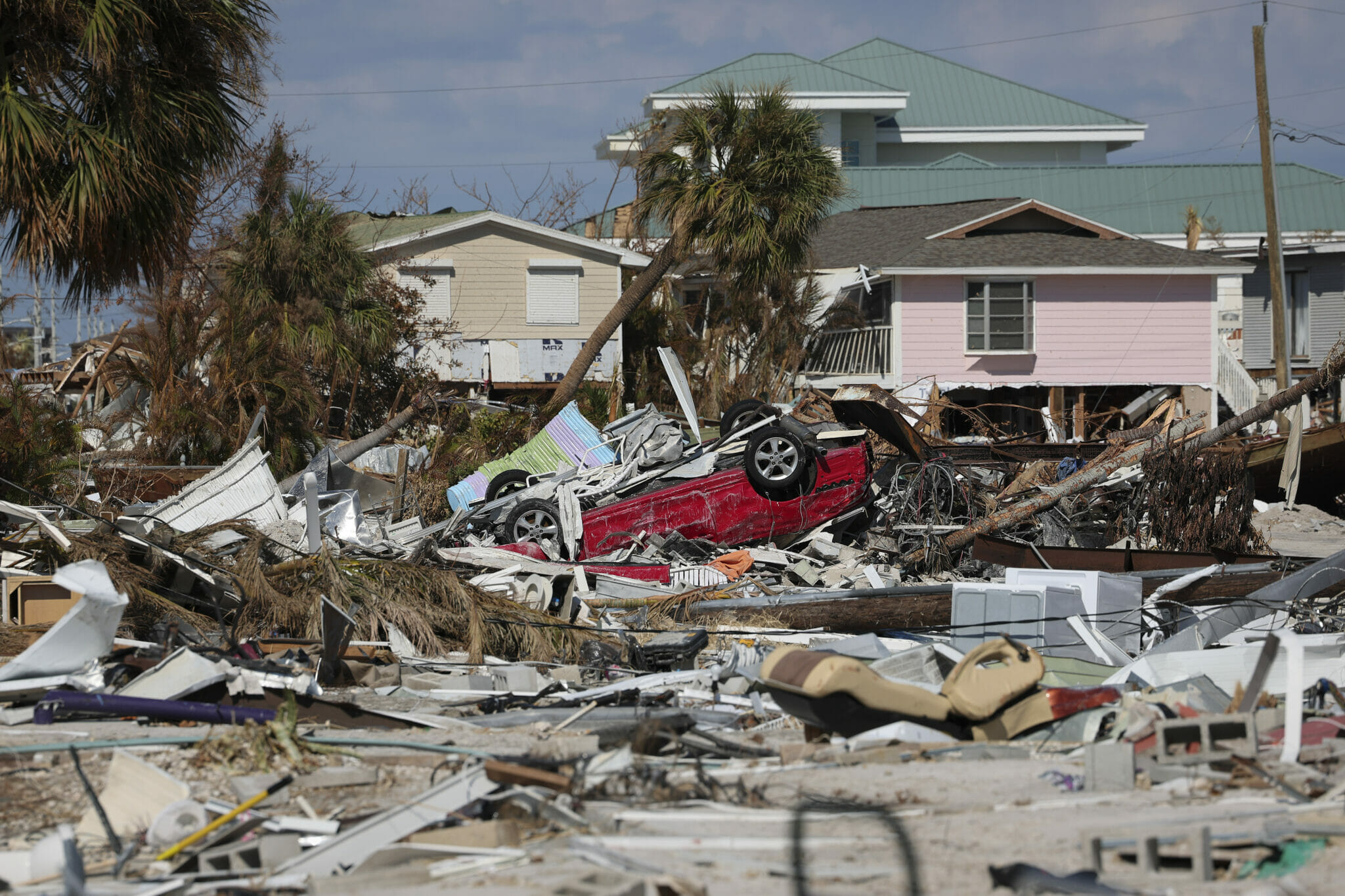“Only connect!” E.M. Forster’s exhortation in the novel ‘Howards End’ is also good advice for climate reporting. When extreme weather events occur — such as Hurricane Ian, which devastated Florida last week, or the record downpours that have flooded Pakistan since June leaving one-third of the country under water— it’s essential for news reports to connect the dots.
Audiences need to hear that today’s extreme heat waves, droughts, and storms are driven partly by global heating; that global heating is mostly caused by burning oil, gas, and coal; and that both will continue to get worse until humanity phases out fossil fuels. Not connecting these dots leaves readers, viewers, and listeners not simply uninformed but misinformed. It’s as if, in covering the pandemic, journalists reported that vast numbers of people were suddenly falling sick and dying but didn’t name Covid-19 as the killer and vaccines as the antidote.
The science linking climate change to extreme weather is long established and robust, as the US National Academy of Sciences, among other scientific bodies, made clear years ago. While many Hurricane Ian stories fell short, some coverage did demonstrate how to briskly and responsibly connect these dots.
As Hurricane Ian approached Florida’s Gulf Coast last Tuesday, CNN anchor Don Lemon asked the NOAA National Hurricane Center acting director Jamie Rhome about how climate change was affecting the storm.
“We can come back and talk about climate change at a later time, I want to focus on the here and now,” Rhome replied. Not letting the matter drop, Lemon asked again. Rhome responded, “On the whole…climate change may be making storms worse, but to link it to any one event, I would caution against that.”
Rhome’s statement was inaccurate and outdated, as experts quickly pointed out. Writing in the Guardian, Penn State University climate scientist Michael Mann and Susan Joy Hassol, director of the non-profit Climate Communication, explained that global warming’s influence is now seen “in every hurricane, torrential rainstorm, flood, heatwave, wildfire and drought.”
How big that influence is can be calculated by climate attribution science. One initial study of Hurricane Ian found that climate change added at least 10% more rainfall to the storm. Experts say it’s the last few inches of rain that can cause the most damage — and that can “mean the difference between having a very soaked lawn and having a few inches of water in your home,” Kevin Smiley, a Louisiana State University professor told The Washington Post.
Ben Tracy, CBS News’ senior national and environment correspondent, showed how quickly and colloquially a reporter can convey the relevant science. “The ocean waters are much warmer than they used to be, and warm ocean water is rocket fuel for a hurricane,” Tracy said on Face the Nation. “So when one of these storms passes over this warm water, it just turbocharges [it].”
Unfortunately, only 4% of initial national TV news coverage of Hurricane Ian made the climate connection, according to Media Matters. Currently, which calls itself “a weather service for the climate emergency,” can help journalists do better. So can the World Weather Attribution research collaboration, which has determined that the severe droughts that struck China, Europe, and North America this summer were made at least 20 times more likely by global warming.
Let’s dispense with the tired notion that it’s improper to talk about climate change while disasters are unfolding. Of course local coverage of a hurricane should prioritize life-saving information that people in harm’s way need. But it takes mere seconds to explain the climate connection that drives extreme weather. And it is precisely while people are seeing the devastation with their own eyes that that message will best connect.
From Us
Burning Questions. Our production team is busy putting the finishing touches on ‘Burning Questions,’ a 1-hour TV special that takes an unprecedented look at the climate story today through the work of the 2022 Covering Climate Now Journalism Awards winners. Watch a preview and set a reminder for the special, premiering October 25 at 8pm US Eastern Time on the WORLD Channel and streaming live on our site.
Noteworthy Stories
Wake up. Ahead of COP27, Pakistan’s climate minister Sherry Rehman, whose country is still reeling from massive August floods, is urging countries in the Global North to keep their promises to reduce emissions and pay for the damaging effects of climate change in developing countries. “This dystopia is on our doorstep; it’s going to be next in their country,” she said, referring to countries in the Global North. By Justin Worland at TIME…
Stop it! In the wake of Hurricane Ian, science educator Bill Nye urged conservative lawmakers and TV networks who misrepresent the facts about climate change to “cut it out.” He told CNN that Hurricane Ian is “exactly the kind of thing that’s predicted by every climate model.” Nye urged nay-sayers to “acknowledge there’s a problem” so the US can implement solutions. By Olivia Rosane at EcoWatch…
It can be done. While much of Southwest Florida has been devastated by Hurricane Ian, a small community endured the storm with significantly less damage. Babcock Ranch, just 12 miles from Fort Myers, calls itself “America’s first solar-powered town” and was built with climate resilience in mind. “We have water, electricity, internet — and we may be the only people in Southwest Florida who are that fortunate,” said one resident. By Rachel Ramirez at CNN…
Carbon pricing, anyone? Economists have long said that taxing carbon dioxide emissions is the best policy tool for curbing climate change (and that returning the proceeds to the public would leave most people better off). The idea has gone nowhere on Capitol Hill, but a former GOP congressman makes a surprisingly persuasive argument that it may soon come to pass. By Bob Inglis for The Invading Sea…
Via Twitter
About a fifth of Palestinians living in Gaza, who face soaring electricity prices as well as daily power cuts resulting from an Israeli blockade, have installed solar panels on their homes; the solar panels are helping some businesses to thrive.
VIDEO: 🇵🇸 Tired of power cuts, blockaded Gaza turns to solar
Palestinians living in the Israeli-blockaded enclave have long endured an unstable and costly electricity supply, so fish farm and restaurant owner Yasser al-Hajj found an alternative solution: solar power pic.twitter.com/r97t8wkuBC
— AFP News Agency (@AFP) October 4, 2022
Free to Publish
The following stories deserve special consideration for republication by CCNow partners:
- The Guardian is producing a seven-part series about the drought in the American Southwest. All stories will be available for republication. The fourth in the series is: The End Of A Way Of Life? Ranchers Struggle To Survive The South-West’s Megadrought
- Reform Our Elections to Secure a Sustainable Future – The Revelator
- ‘Yes, We Love Our Heat Pump’: Fossil-Free Household Cancels Contract with Gas Company – The Energy Mix
For partner outlets: The full list of stories available for republication and instructions to do so can be found in our Sharing Library. To submit stories for sharing, please use this form.
Resources and Events
COP27 hub. The World Resources Institute (WRI) has launched a COP27 resource hub laying out key issues to watch ahead of the UN conference in November as well as articles, research, and webinars. Check it out.
- WRI will hold a webinar about what’s at stake for Africa at COP27. Topics will include how to restore forests, protect food supplies, and build in a climate resilient way. October 18. RSVP.
Accreditation. Media accreditation for COP27 closes today, October 6.
Climate journalist. Author and journalist George Monbiot, who was awarded the 2022 Orwell Prize for Journalism, will discuss his prize-winning pieces, including “Capitalism Is Killing the Planet” and the myth of “Green Growth.” October 13. RSVP.
‘The Petroleum Papers.’ That’s the title of a new book by investigative journalist Geoff Dembicki that Bill McKibben calls “a truly needed compendium of Big Oil’s endless lies.” Read more.
Jobs, etc.
Jobs. The Texas Tribune is hiring a Houston-based energy reporter. CBS News in Minneapolis, MN is hiring a meteorologist.
Training. The Oxford Climate Journalism Network is looking for 100 reporters, editors, and graphic designers from all beats, from sports to business to politics, to participate in their six-month online training program. The Reuters Institute will hold an info session via Twitter on October 7. The application deadline is October 21. Learn more.

